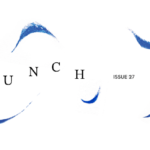Menu
Sonnet of Motion by Tomaž Šalamun
translated from the Slovenian by Brian Henry
Stories that have a first scene, a second
scene, a first border, a second border, surrender like
a lump of meat. The brain slips and smacks its lips.
Radical light is always muscular,
it eliminates situations where you can look back.
And from its head leaps another material,
untouchable thoughts. And the swift chamois that
crouches mid-leap, ledges that
consume consciousness and stay
far behind, restraining their scent and
terror—musk. Is the chamois gone, where’s
the chamois? He stood a meter, like a notion
of whiteness. Don’t search here because
I’ve spoken. There’s consistently nothing here.
Štorije, ki imajo prvi teren, drugi
teren, prvi rob, drugi rob, se vdajo kot
kepa mesa. Možgani drsijo in mlaskajo.
Radikalna svetloba je vedno mišičasta,
eliminira stanja, kjer se lahko ozreš.
In z njene glave skoči drug material,
nedotakljiv misli. In urni gamsi, ki v
skoku pokleknejo, police, ki so
konzumna raba zavesti in ostanejo
daleč zadaj, zavrejo njihov vonj in
teror—mošt. A ni več gamsa, kje je
gams? Vstal je kot meter, kot pojem
beline. Ne iščite tu, ker sem
izrekel. Tu dosledno ničesar ni.
Brian Henry is the author of eleven books of poetry, most recently “Permanent State”, and the new prose book “Things Are Completely Simple: Poetry and Translation”. He has translated Tomaž Šalamun’s “Woods and Chalices”, Aleš Debeljak’s “Smugglers”, and five books by Aleš Šteger. His work has received numerous honors, including two NEA fellowships, the Alice Fay di Castagnola Award, a Howard Foundation fellowship, a Slovenian Academy of Arts and Sciences grant, and the Best Translated Book Award.
KEEP ON READING
From Pantyhose for Daisy by Dewi de Nijs Bik tr. Emma Rault
Poetry | Issue 26: Shifting (translated
No Comments
No Comments
No Comments

